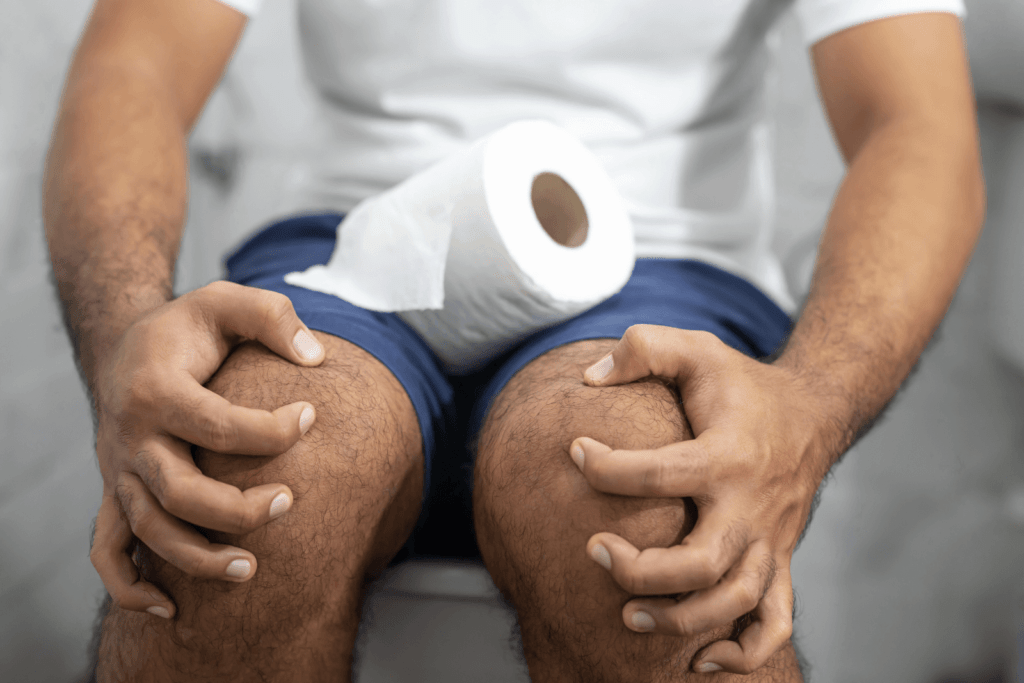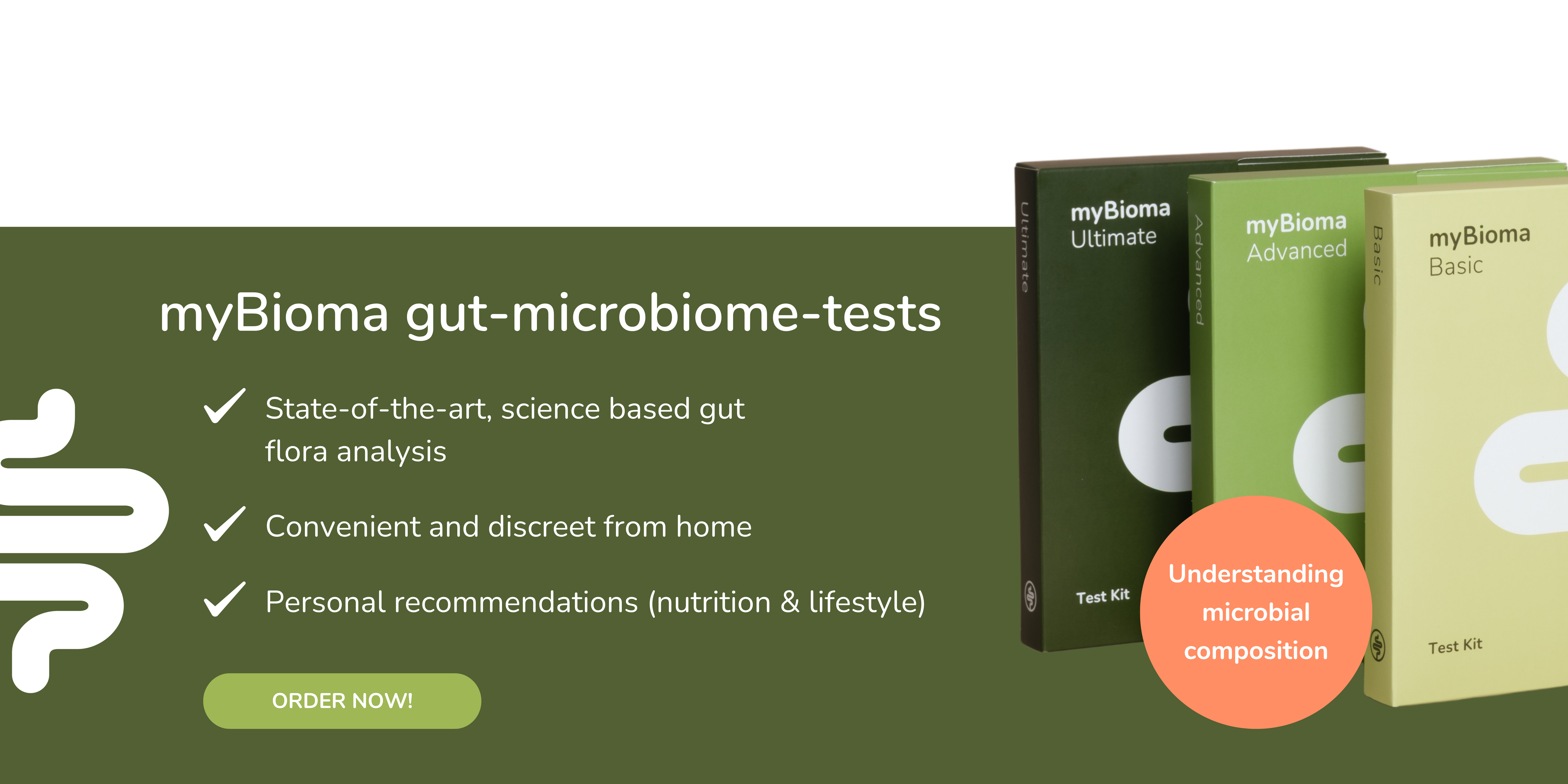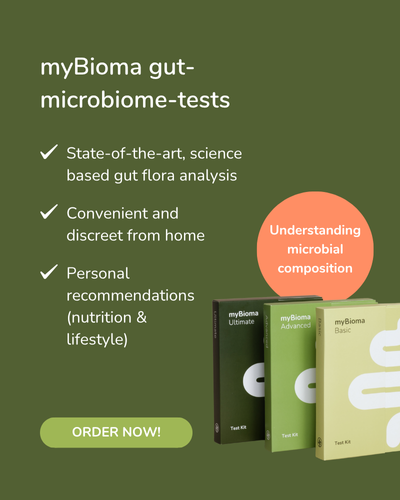Table of contents
- When do we talk about constipation?
- One cause of constipation: gut bacteria
- What should you eat if you are constipated?
- Why you should eat breakfast if you suffer from constipation
- Are probiotics helpful for constipation?
- Drink enough water!
- How important is regular exercise for constipation?
- Abdominal massage for constipation
- One possible cause of constipation: stress
- See a doctor for long-term problems
Constipation is an unpleasant symptom that regularly affects about 15% of the population. It can affect the quality of life because defecation is difficult and often painful. Often the causes of constipation, such as stress, lack of exercise or the wrong diet, are harmless and can be quickly remedied, but sometimes serious illnesses can be behind it. In this article you will learn about possible causes of constipation and which home remedies and tips can help quickly.
When do we talk about constipation?
Constipation is when you have a bowel movement less than three times a week. A distinction is made between acute and chronic constipation. For the most part, constipation is considered harmless. However, they can also be a symptom of other diseases, such as irritable bowel syndrome, constipation, changes or disorders in the rectum. By the way, constipation is already considered a disease of civilisation, as 15% of the population suffers from it regularly. Women and older people are affected much more often. (1,2,3)
One cause of constipation: gut bacteria
Many studies have already shown that changes in the gut microbiome influence constipation and sometimes even trigger it. For example, lactic acid bacteria in the “constipation microbiome”(lactobacilli and bifidobacteria) are greatly reduced. In addition, people with faster bowel motility seem to have more Firmicutes (especially the Faecalibacteria, Lactococci and Roseburia subgroups). Ruminococci are more abundant in constipation and also contribute to the symptoms. These changes in the microbiome show us how important the gut bacteria are for a healthy gut and how we can better treat constipation. However, the questions about the microbiome and constipation are far from settled because it is an incredibly complex system (4, 5, 6)
Through the myBioma analysis of the gut microbiome , you can find out which healthy and disease-causing bacteria live in the gut – whether the bacteria can cause constipation, for example, as described above.

Artichokes contain plenty of fiber, which stimulates your intestines.
What should you eat if you are constipated?
There is far too little fibre in our diet these days – but it is precisely this fibre that is essential for your microbiome and even necessary for regular trips to the toilet. Such foods are often called prebiotics – substances that can only be broken down with the help of gut bacteria. When dietary fibres enter the gut, they absorb plenty of water and swell. This makes your gut feel fuller and gives it more incentive to move – until something has to come out the bottom. The top prebiotics (or fibre-rich foods) are artichokes, garlic, leeks, onions, asparagus, whole grains and bananas. Many other vegetables and fruits also contain plenty of fibre to fuel your gut. Conclusion: include more fibre in your daily diet and your gut will join in! (7)
Why you should eat breakfast if you suffer from constipation
The gut is particularly active in the morning. That’s why most of us do our big business in the morning. To give the gut the right stimulus in the morning, a balanced breakfast rich in fibre can help. If more food comes from above, the gut has to make room at the bottom! Whole-grain mueslis made of oatmeal, flaxseed and prunes, with fresh banana and yoghurt are particularly suitable for this purpose – they offer a lot of fibre (prebiotics) and also probiotics.
Are probiotics helpful for constipation?
Some foods are made with the help of bacteria – for example yoghurt, cheese, buttermilk or sauerkraut. Usually lactic acid bacteria (lactobacilli and bifidobacteria) are used, which remain alive even after production. When you eat them, they then enter your gut and make themselves very useful there too. Some studies have discovered that probiotic foods promote gut health. For example, the bacteria E. coli Nissle, Bifidobacterium animalis and lactis were found to relieve constipation. So eating probiotic foods regularly could improve your symptoms. By the way, sauerkraut can also work wonders for constipation due to its high fibre content! (4)

The German Nutrition Society recommends a minimum consumption of 1.5 liters to 2.7 liters.
Drink enough water!
You’ve probably heard this a lot: drink enough water! This is especially important if you eat a lot of dietary fibres. As mentioned above, fibre swells in the gut with the help of water. The German Nutrition Society recommends a minimum consumption of 1.5 to 2.7 litres of water daily. (8) To make sure you drink enough, always keep a jug of water at your desk.
How important is regular exercise for constipation?
Another factor that affects your gut is physical activity. When you exercise, countless skeletal muscles work together. This also moves the gut and at the same time stimulates it to send the stool further “down”. Everyone has had the experience that after days of sitting and studying, the gut simply stops. This is exactly why it is so important to go outside when constipated and to stimulate the entire body again. (9)
Abdominal massage for constipation
If your gut still doesn’t want to get going, you can try a simple gut massage. Lie down in bed and massage your stomach with a little body lotion. It’s best to massage from all directions, from the bottom, top, right and left of your abdominal wall towards your navel. Apply gentle pressure with your fingers to stimulate your gut. Then place your fingers on the lower right side of your abdomen and move clockwise along the large intestine in a large square. Repeat these steps at least three times. This way you can stretch out your gut – and it can work wonders for constipation!
One possible cause of constipation: stress
We all know it – when travelling or under stress, bowel movements are even more difficult. This is because your body and mind need to be relaxed in order for your gut to work properly. But sometimes it can be difficult to relax and the more you think about constipation, the worse it gets. This is where meditation and various relaxation techniques can help. In autogenic training, for example, you practice feeling the body in its calmness and warmth and breathing in a relaxed way. These strategies can contribute to a stress-free gut and relieve constipation in the longer term. (10) You can also try gut directed hypnosis . Studies have shown that regular practice can help with IBS.
See a doctor for long-term problems
If you reach your limits with typical home remedies and recommendations and there is simply no improvement in sight, a visit to your GP is important. Don’t worry, you are not alone in your symptoms and a medical check-up can help. Your doctor may examine you in more detail and prescribe a medication that stimulates the gut. None of this should frighten or embarrass you – constipation is incredibly common and regular bowel movements are part of life. As mentioned above, some gut bacteria can also be linked to constipation. If you want to learn more, you can order the myBioma analysis kit at home and have your own gut microbiome analysed.
References
- Zhao Y, Yu YB. Intestinal microbiota and chronic constipation. Springerplus. 2016 Jul 19;5(1):1130. doi: 10.1186/s40064-016-2821-1. PMID: 27478747; PMCID: PMC4951383
- Andresen V et al. S2k-Leitlinie Chronische Obstipation: Z Gastroenterol 2013
- Mearin F, Lacy BE, Chang L, et al. Bowel Disorders. Gastroenterology. 2016.4
- Choi CH, Chang SK, Alteration of gut microbiota and efficacy of probiotics in functional constipation. J Neurogastroenterol Motil. 2015;21(1):4-7.
- Parthasarathy G, et al. Relationship Between Microbiota of the Colonic Mucosa vs Feces and Symptoms, Colonic Transit, and Methane Production in Female Patients With Chronic Constipation. Gastroenterology 2016;150(2):367-79.e1.
- Rajilić-Stojanović M, et al. Intestinal Microbiota And Diet in IBS: Causes, Consequences, or Epiphenomena? Am J Gastroenterology. 110, 278 (2015).
- Moshfegh AJ, et al. Presence of inulin and oligofructose in the diets of Americans. J Nutr. 1999;129(7 Suppl):1407S-11S.
- Deutsche Gesellschaft für Ernährung, D. Die Nährstoffe. 2018:17-21.
- Organization WH, Global Health Risks, Mortality and Burden of Disease Attributable to Selected Major Risks. World Health Organization, 2009.
- Schultz JH, Das autogene Training. Konzentrative Selbstentspannung. Stuttgart 1970 .







